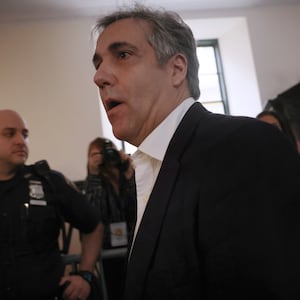Former President Donald Trump won’t face repercussions over the way he appears to have used federal prison guards to intimidate his former lawyer, Michael Cohen, jailing and silencing him in 2020 ahead of his tell-all memoir about the billionaire’s mob-like behavior.
On Tuesday, the Second Circuit Court of Appeals in New York affirmed a federal judge’s decision to dismiss the case, which dealt with a particularly authoritarian episode in the final year of Trump’s presidency. The three-judge panel wouldn’t let Cohen use a legal remedy that allows someone who’s been abused by federal agents to seek justice for the misconduct.
However, the panel tacitly acknowledged that something unfair clearly happened. The judges noted how the then-president’s archenemy was thrown back in prison on flimsy reasoning, and how the case was only resolved through some extraordinary intervention by a judge who eventually ordered that Cohen should be released.
Ironically, the judges ruled it was that very intervention that now prevents Cohen from holding Trump and certain government agents accountable, citing a 1971 Supreme Court case called Bivens v. Six Unknown Named Agents.
“While this relief may not have made Cohen whole, ‘when alternative methods of relief are available, a Bivens remedy usually is not,’” they wrote on Tuesday.
The 8-page appellate ruling could spell the end of Cohen’s case, which provided a troubling window into the long-brewing personal feud between the billionaire and the man he once trusted with his secrets.
During Trump’s time in the White House, the feds in New York began to crack down on the way Trump paid off the porn star Stormy Daniels to keep her quiet about their one-night affair in a bid to spare his 2016 presidential campaign from the story. The case essentially ended in 2018 after federal prosecutors at the Southern District of New York took down Cohen on campaign finance violations and unrelated tax charges, given that he was the one who arranged the payoff and was reimbursed for it as Trump’s personal lawyer.
But as Cohen languished at the federal prison in Otis, New York, he was also working on his book, Disloyal. When the COVID-19 pandemic ravaged the globe and some American prisoners were allowed to continue their sentences confined at home, Cohen was allowed to remain at his New York City apartment—where he let the world know his damning memoir was coming.
Cohen was stuck at home for two months when he was told to check in at a local U.S. Probation and Pretrial Services office in July 2020. When Cohen showed up with his lawyer, two officers surprised them with a draft location monitoring agreement—one that included curious language that would prohibit Cohen from using any social media or talking to journalists, perfectly timed to keep him from ginning up press for his upcoming book.
Cohen and his attorney merely asked the officers if it would be possible to adjust the wording in the legal agreement. The officers said they’d check with their supervisors, disappeared for an hour and a half, then suddenly came back with orders to toss Cohen back in prison. The thorn in Trump’s side was then put into solitary confinement for 16 days until a federal judge managed to get him pulled out.
“He spent roughly twenty-three and a half hours a day alone with poor ventilation and no air conditioning,” appellate judges acknowledged in their order on Tuesday.
However, they wouldn’t go as far as allowing Cohen to actually seek retribution against the federal agents who did it—or allow Cohen to seek evidence that might show whether an American president misused the power of the office to seek vengeance on the man he alleges betrayed him.
Cohen sued in December 2021, arguing that his rights were violated—pointing the finger at Trump, then-Attorney General Bill Barr, and the federal agents who carried out the deed. A federal judge dismissed his claims in November 2022. Today’s appellate ruling sided with the judge.







